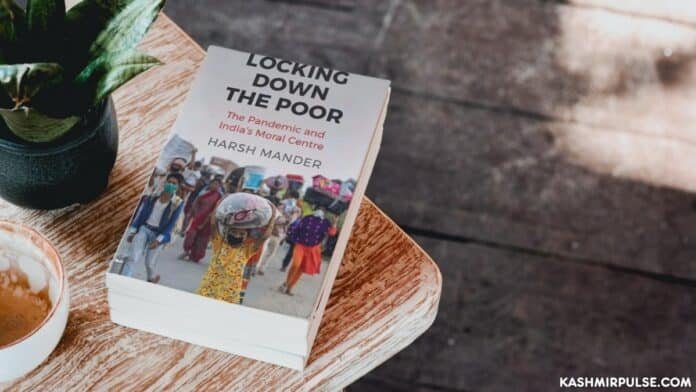
Locking Down The Poor is merely evidence of the biggest humanitarian crisis after partition by their own government which failed to tackle the situation and plunged a population of 1.3 billion into nationwide lockdown within less than four hours of notice.
Harsh Mander is one of India’s most trusted and courageous social justice and human rights activists. He also has served as Special Commissioner to the Supreme Court of India in the Right of Food campaign. Mander is also the author of several acclaimed books on contemporary India including Looking Away: Inequality, Prejudice and Indifference in New India; Partitions of the Heart: Unmaking the Idea of India etc.
On the night of March 24, 2020, the country’s Prime Minister announced a nationwide lockdown due to COVID-19, giving the population of over 1.3 billion less than four hours notice and imposing the world’s longest and most stringent lockdown with no or smallest relief packages and pushed them to the brink of starvation.
Locking Down The Poor: A result of Mander’s groundwork with “Karvan-e-Mohabbat”
Mander’s groundwork with “Karvan-e-Mohabbat” helped him to write tragic incidents which he witnessed himself while working with a vulnerable group of people during and after lockdown.
Mander in his book brings us accounts of out-of-work daily wagers and informal workers, the homeless and the destitute, all overwhelmed by hunger, helplessness, humiliation and dread: from the highways and the overcrowded quarantine centres and stories of migrant workers who walked hundreds of kilometres to reach their homes.
Mander’s Locking Down The Poor – The Pandemic and India’s Moral Centre is written in lucid language so one can understand easily the callousness of the government policies. The book includes 12 chapters that all depict the ground realities in a well-articulated and organized manner.
Excellent blend of hard data and real-life stories
Mander combines the hard data and life stories he went through during his excellent work on the ground as a social worker of his NGO “Karvan-e-Mohabbat” who facilitated lakhs of people with mid-day meals and other facilities when the government couldn’t provide relief to the poor people and the destitute ones. It’s merely a joke to maintain social distancing where people live in slums, shanties and where families of five to six members live in one room and do not have separate washrooms as well.
He writes, “A young woman with listlessness baby at her hip speaks into the camera held by my young colleagues who are interviewing people affected by the lockdown. She addresses Prime Minister Modi and Chief Minister Kejriwal. ‘Is this the state you want to reduce us to?’ she asks them piercingly. Another woman says, ‘We fear we are fated to die. They say this Corona illness will go on for a year. They will later say we died of Corona, but actually would have died of hunger.'”
“Residents of both settlements tell us that as summer is peaking, drinking water is becoming as scarce as food. There has never been a water supply of any kind in either settlement or public tap. In Majnu ka Tila, they usually carry water in plastic containers from outside an apartment building a kilometre away, and in Tughlakabad, they beg the driver of the tanker that comes to water the trees lining the main avenue for some water. This has become near impossible now; the police chase them back, often thrashing them with their lathis for violating ‘Modi ji’s curfew‘. Bathing even occasionally has become a challenge, and washing hands frequently, of course, was out of the question even before the lockdown.”
While reading the book, tears flow from my eyes, and heartwrenching incidents are mentioned in the book. To wash your hands properly, you need at least two litres of water. Where there is a scarcity of water to drink, how could you wash your hands with water? People couldn’t afford soap, how they could buy handwash and sanitisers?
Mander also addresses the ‘flames of hate against Muslims’ during COVID-19 spread
The Muslim community also was targeted by the government as they allegedly spread the infections of Corona in India. Mander writes, “The flames of hate against Muslims lit by the tenor of official briefings, amplified by hysterical media reports and biased television debates, then engulfed the entire country, their spread aided by the loyal trolls of social media including members of the infamous BJP IT Cell.”
“A flood of fake videos was unleashed on the internet, depicting Muslims deliberately smearing vegetables and fruits with their saliva, spitting into the food served in restaurants and coughing into the faces of other people, all with the intent of infecting non-Muslims. 166 Hashtags like #CoronaJihad, #BioJihad and #TablighiJamaatVirus began to circulate and trend.”
“Two researchers, Soundarya Iyer of the French Institute of Pondicherry and Shoibal Chakravarty of the Divecha Centre for Climate Change at the Indian Institute of Science found 11,074 stories published from 271 media sources with the term “Tablighi Jamaat’ from March 20, 2020, to April 20, 2020. Their analysis noted that the words that frequently appeared alongside ‘Tablighi’ and ‘Jamaat’ were ‘Coronavirus’, ‘Delhi’, ‘lockdown’, ‘violating’, ‘crime’, ‘spitting’, ‘terrorist’ and ‘jihad’. Even a leading newspaper like the Times of India, the country’s largest-selling English daily, carried as many as 1863 stories of the Tablighi Jamaat in these five weeks, which were shared 3,19, 921 times on Facebook.”
“These stories fed into an epidemic of Islamophobic fake news and hate speech,” they wrote in The Hindu BusinessLine. This was ‘exploited for the production of misinformation and hate’.
This book is a critique of the callousness approach of the government and its unequal approach to society. Locking Down The Poor is a poignant book written in lucid language, which is absolutely a good read.
The flap of the book is well-designed and somewhat unique. The book looks good but the paper quality could have been better at the price this book is selling for.
Book: Locking Down The Poor
Genre: Non-fiction/Current Affairs
Author: Harsh Mander
Publisher: Speaking Tiger Books
Year of Publication: 2021
ISBN: 978-9389958751
Pages: 240
Price: ₹399 / $5.30 (Approx.)
Follow Us
The Kashmir Pulse is now on Google News. Subscribe our Telegram channel and Follow our WhatsApp channel for timely news updates!




![Dark Endeavour [Book Review] Dark Endeavour [Book Review]](https://kashmirpulse.com/wp-content/uploads/2022/06/Dark-Endeavour-Book-Review-218x150.jpg)





